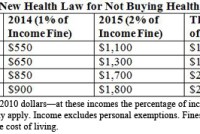Latest KFF Health News Stories
Nine Ways The New Health Law May Affect You in 2011
In 2011 many new provisions of the health law kick in, providing benefits for many and potential new costs for some others.
Long-Term Care: Another Tough Subject For The Next Round Of Reform
Democrats and Republicans may spend the next two years fighting about what to jettison or retain in the new health law. If these battles are resolved, we’ll be back to address another looming challenge: long-term care. It’s best that this happen sooner rather than later.
Insuring Your Health: Looking At The Changes 2011 Brings
Michelle Andrews speaks with KFF’s Jackie Judd about changes in lifetime insurance limits, keeping children insured, the new high-risk pools, rising health costs and consumers’ misperceptions about the overhaul.
Video: Q&A with Michelle Andrews: Seeking Health Coverage When Traditional Coverage Is Out Of Reach
Michelle Andrews answers a question from a consumer about options for seeking health coverage when cost and other considerations put most other coverage out of reach.
Video: Q&A with Michelle Andrews: Preventive Health
Michelle Andrews answers a question from a consumer about why health plans are not touting more preventive health care to save on costs in the system. But, as Andrews details, new plans are going to have to provide many different sorts of preventive health services for free.
Video: Q&A with Michelle Andrews: Options To Get Health Coverage On Your Own
Michelle Andrews answers a question from a consumer about what to consider when looking to buy a health insurance plan.
New Rules Would Require Insurers To Justify Double-Digit Rate Increases
The Obama administration’s proposed rule would require health insurers to explain in detail any rate increase of 10 percent or more in 2011.
Some Policies Restrict Coverage By Limiting Visits To The Doctor
The new health law eliminated lifetime and most annual dollar limits for consumers but some plans cut costs by covering only a defined number of doctor appointments, prescriptions or other services.
State Insurance Officials Approve Rules For Descriptions Of Health Policies
Under the health overhaul law, insurers will be required to provide their benefits information on a standardized chart using the same plain English terms as other companies to help shoppers understand and compare complicated policies.
Is The Individual Mandate Really A Lynchpin In The New Health Law?
The individual mandate as included in the health overhaul isn’t even close to what it has been made to be — a provision that would protect the integrity of the health insurance market by forcing people to buy health insurance before they became sick.
Few Seniors Have Long-Term Care Insurance
Given the complexity of these high-cost policies, experts agree it’s tough to decide whether they’re right for you.
Transcript: Stuart Taylor On Health Law Decision
Jackie Judd talks with attorney and journalist Stuart Taylor about the ruling today by U.s. District Court Judge Henry Hudson that one part of the new health law is unconstitutional.
New Rules Spell Out Protections For Consumers With ‘Limited Benefit’ Insurance Policies
HHS says that employers and insurers have 60 days to send out detailed notices to consumers on the limitations of their health insurance policies, which could have effects on so-called ‘mini-med’ policies.
Big Health Insurers Seek To Boost DC Influence
Five large health insurers are shopping for a public relations firm as they build a coalition to influence implementation of the health law and congressional action on it.
Health Insurance Brokers Fight For Their Future
The new health law appears to threaten the future of many health insurance brokers, but they say the service they provide is worth the money.
Replace The Tattered Medicaid Long-Term Care Safety Net
Medicaid, the state-federal health program that also pays for nearly half of all long-term care services for the frail elderly and younger people with disabilities, is in big trouble.
If Employers Walked Away From Health Coverage
What would happen if the rank and file of America’s employers, financially overwhelmed by the burden associated with sponsoring health coverage, suddenly opted not to? It’s an idea that is not so far-fetched.
Obama Administration Clashes With Insurers Over Controlling Costs
One day after unveiling new minimum medical spending rules for health plans, Obama administration officials took insurers to task for claiming premium increases result from the new law.
Retirees Can Find Insuring Young Adult Children Difficult
Medicare doesn’t cover dependents, and many private retiree health plans are not affected by the new health law so they can kick young adults out after school ends.
Health On The Hill Transcript: Medical Loss Ratio, Doc Fix
HHS released regulations on the medical loss ratio, a provision in the health law that requires insurers spend at least 80 percent of premium dollars of health care. Meanwhile, before the Senate adjourned for Thanksgiving it passed a one-month ‘patch’ to prevent physicians who see Medicare patients from having their payments reduced.













